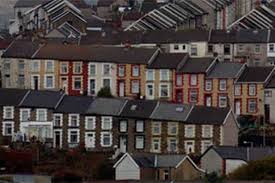- News to celebrate! - 1st March 2026
- Bombs away! - 28th February 2026
- Massaging the truth - 27th February 2026

Owners of property in Wales which are let out to tenants have condemned as a joke plans to penalise them financially, declaring that politicians are ignoring facts such as rents going up, and that the sector provides an essential service bringing in millions of pounds.
The Treasury (with Rachel Reeves still at the helm) is reportedly considering a tax on landlords that will target income from rents in the Autumn budget, with the proposals centred on the expansion of National Insurance (NI) to include rental income, which is currently exempt from the levy, as part of a broader push to plug a potential £40 billion shortfall in the public finances.
Yet landlords and landladies have heavily criticised the possible move saying that it doesn’t take into account the homes provided, rents increasing, and the more than one and a half billion pounds a year the Private Rented Sector (PRS) in Wales generates for the UK economy.

One landlord in Wales who preferred to remain anonymous as he had to negotiate the changing regulations, said: “This is madness. Over 1,000 landlords have gone in Wales in the last few years because government rules have made it more difficult. The plain fact is, though, that young people need places to live”.
Another one posted the following outraged message on Facebook (FB) and included a link to the report about it: “Have a guess what will happen to the amount of rent I charge on my properties if I’m going to be taxed on it. Which direction do you think rent prices will head in, up or down? Oh and by the way, I’m already taxed on it, because it’s included in my status as a self-employed person. Labour is no friend to renters”.
The Welsh PRS makes a Gross Value Added (GVA) contribution of £1.6 billion to the UK economy, according to a report produced by professional services firm PwC UK for the National Residential Landlords Association (NRLA) and Paragon Bank (PB).

The sector is enormously important as a driver of economic growth in Wales, accounting for almost two per cent of Welsh GVA.
The report also reveals how the PRS across England and Wales, supports around 390,000 jobs, including those in construction, building maintenance, and public administration.
The report’s findings also endorse the central role that Cardiff has in Wales, and how the increasing numbers of tenants has emphasised its status; with the Cardiff Capital Region proving a crucial player in providing employment and wealth-creating opportunities.

It has a GVA, of more than £25 billion and accounts for at least 51 per cent of the income generated in the Welsh economy.
The desired outcomes in the region from its many programmes of intervention (£734 million of which is ring-fenced for Metro developments with the remaining £495 million available through a wider investment fund), are to deliver over 20 years 25,000 new jobs, generating an additional £4 billion of private sector investment, and increasing GVA by five per cent.


Ben Beadle, Chief Executive Officer (CEO) at the NRLA, proclaimed that research has underlined: “…how private landlords support much-needed employment for many across Wales.
“At a time of ongoing sluggish national economic growth, the Government needs to recognise the contribution the sector makes by encouraging the conditions for greater investment in homes for rent.
“Doing so will help build a PRS which works in the interests of landlords and tenants throughout the country”.

PB Managing Director (MD) of Mortgages Richard Rowntree added: “Landlords in Wales play a vital role in providing rental housing for a range of tenant types, including the country’s thriving universities and economic centres in the South and North of the country. It’s important that landlords are incentivised to continue their participation in the sector; anything less could result in less choice and higher rents for tenants”.
James Bailey, UK Housing Leader at PwC UK noted: “We estimate that the private rented sector of the market contributes £45 billion of value to the wider UK economy each year. This includes contributing £1.6 billion to the Welsh economy and supporting 14,000 jobs in Wales, which demonstrates the significance of the sector in the Welsh and UK-wide economy”.
 But even before the idea of new taxes for landlords was being contemplated, they were under pressure.
But even before the idea of new taxes for landlords was being contemplated, they were under pressure.
New data from Rent Smart Wales (RSW) found that of the 22 local authorities in Wales, 17 saw a fall in the number of landlords between January 2020 and January 2025, with the punitive Renting Homes (Wales) act implemented in 2022.
Propertymark’s Tim Thomas, Policy and Campaigns Officer (PCO) stated: “Given…concerning figures from across most Welsh communities, the Welsh government must follow our call for pro-growth taxation and reduce Land Transaction Tax for landlord investors”

Perhaps imposing a fresh tax on landlords may not promote the ‘pro-growth’ policies Rachel Reeves says she wants…
The memories of our Editor, Welshman Phil Parry’s astonishing decades-long award-winning career in journalism as he was gripped by the rare disabling condition Hereditary Spastic Paraplegia (HSP), have been released in a major book ‘A GOOD STORY’. Order it now.
Tomorrow – how covering major political stories has always been paramount for Phil as he pursued his long journalistic career, so he found events at Westminster fascinating, with the major reshuffle after Angela Rayner’s resignation described as a way to take on Reform UK, which is likely to make major inroads at Welsh elections.










